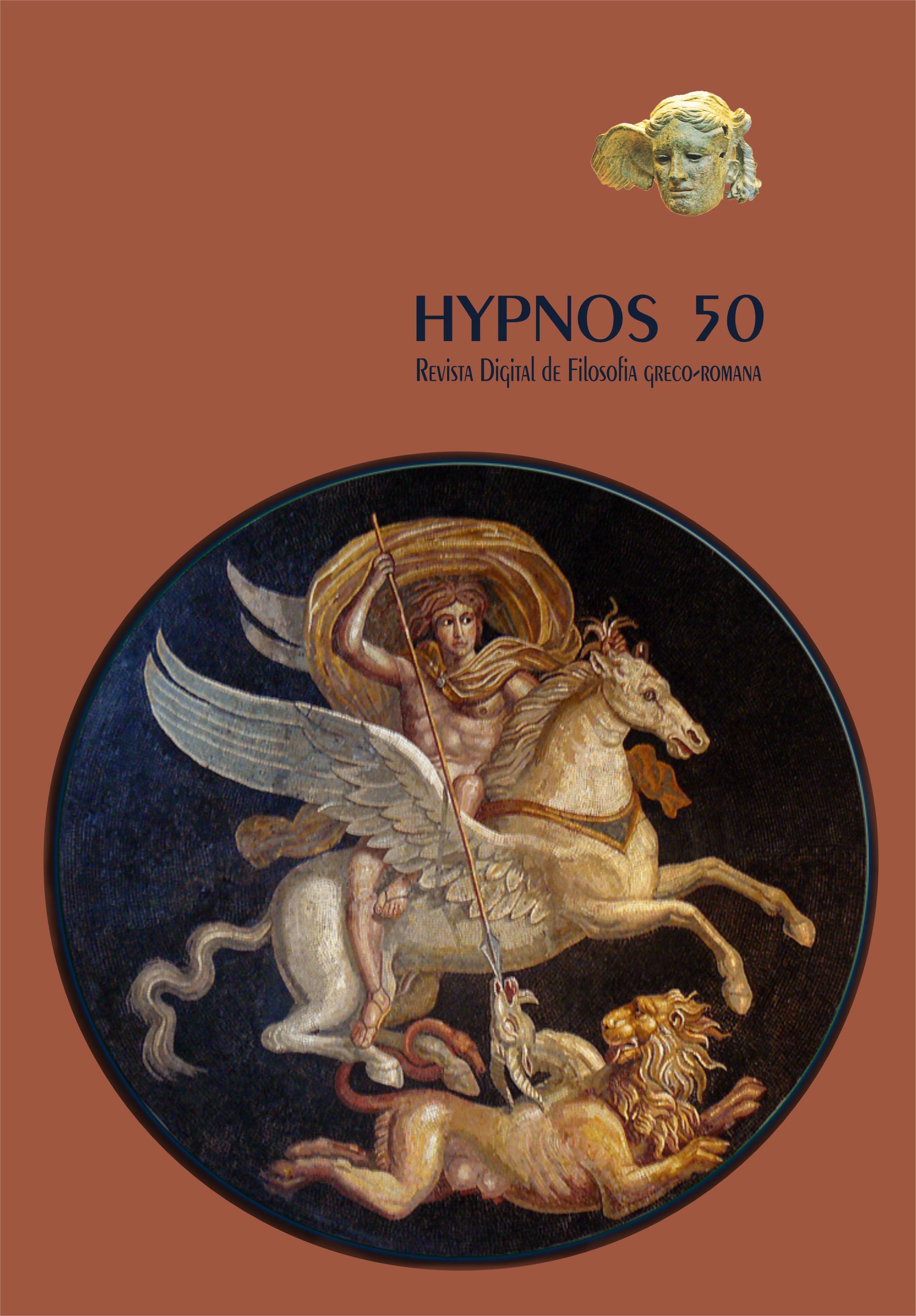Ariston of Chios and the use of the simile of the sage as a good actor
Keywords:
Ariston of Chios, Indifference, Wisdom, StoicismAbstract
Among the few ideas or theoretical proposals associated with the heterodox Stoic Ariston of Chios (3rd century BC), we find the idea that the sage is like a good actor. Scholars of Stoicism do not have a uniform answer about what is the meaning and use or function of this comparison within Ariston's thought. In this paper I offer answers to these questions. First, I explain what it means this simile. Second, I propose that the simile of the actor in Ariston has an explanatory use about why Ariston proposed that one should live indifferently. And also I suggest that this simile can illuminate what it means to live indifferently, and the life according to nature.
References
ALESSE, F. Panezio di Rodi e la Tradizione Stoica. Napoli: Bibliopolis, 1994.
ARMIN VON, H. Stoicorum Veterum Fragmenta, vol. I: Zeno et Zenonis discipli. Stuttgart: Teubner, 1978. = SVF.
AX, W. M. Tulli Ciceronis Scripta Quae Manserunt Omnia: De natura deorum. fasc. 45. Leipzig: Teubner, 1933. Available at: <https://latin.packhum.org/loc/474/50/0#0>. Access on: 19/10/2022.
BÉNATOUÏL, T. Faire Usage: La Pratique du Stoïcisme. Paris: Librairie Philosophique J. Vrin, 2007.
BÉNATOUÏL, T. Épictète et la doctrine des indifférents et du telos d’Ariston à Panétius. Elenchos, 40(1), 2019, p. 99–121.
BOERI, M. y R. Salles. Los filósofos estoicos: ontología, lógica, física y ética, traducción, comentario filosófico y edición anotada de los principales textos griegos y latinos. Sankt Augustin: Academia Verlag, 2014. = BS.
BOYS-STONES, G. The ἐπελευστικη διναμις in Aristo’s Psychology of action. Phronesis, 41, 1996, p. 75-89.
DORANDI, T. Diogenes Laertius: Lives of Eminent Philosophers. Cambridge: Cambridge University Press, 2013. Available at: <http://stephanus.tlg.uci.edu/Iris/Cite?0004:003:0>. Access on: 18/10/2022.
FISCHER, C. T., Diodorus, Bibliotheca Historica, vol. IV. Stuttgart: Teubner, 1985. Available at: <https://www.europeana.eu/item/794/ark__12148_bpt6k25052t?utm_source=api&utm_medium=api&utm_campaign=YuvuWBeCa >. Access on: 18/10/2022.
FREDE, M. A Notion of a Person in Epictetus. In Mason, A. S and T. Scaltsas (eds.). The Phisosophy of Epictetus, Oxford/New York: Oxford University Press, 2007, p. 153-168.
GUILLÉN CABAÑERO, J. Cicerón: Sobre los deberes. Madrid: Aliaza, 2001.
IOPPOLO, A. M., Aristone di Chio e lo stoicismo antico. Naples: Bibliopolis, 1980.
IOPPOLO, A. M. Chrysippus and the Action Theory of Aristo of Chios. In Kamtekar, R. (ed.). Oxford Studies in Ancient Philosophy, suplementary volume, 2012, p. 197-222.
KINDSTRAND, J. F. Bion of Borysthenes, Uppsala: University of Uppsala, 1976. Available at: <http://stephanus.tlg.uci.edu/Iris/Cite?1224:001:0>. Access on: 18/10/2022.
MARRIN, B. Ariston of Chiosand the Sage as Actor: on the Stoic Concep of Persona. Ancient Philosophy, vo. 40, no. 1, 2020, p. 179-195.
MARTOS MONTIEL, J. F. Sexto Empírico: Contra los Dogmáticos. Madrid: Gredos, 2012.
MEINEKE, A. Strabonis geographica, vol. 1. Leipzig: Teubner, 1877. Available at: <http://stephanus.tlg.uci.edu/Iris/Cite?0099:001:0>. Access on: 18/10/2022.
MUTSCHMANN, H. Sexti Empirici opera, vol. 2. Leipzig: Teubner, 1914. Available at: <https://babel.hathitrust.org/cgi/pt?id=njp.32101076512902&view=1up&seq=5&skin=2021>. Access on: 06/03/2022.
ORTIZ GARCÍA, P. Epicteto: Disertaciones por Arriano. Madrid: Gredos, 1993.
PIMENTEL ÁLVAREZ, J. Marco Tulio Cicerón: Cuestiones académicas. México: Universidad Nacional Autónoma de México, 1990.
SCHENKL, H., Epicteti dissertationes ab Arriano digestae. Leipzig: Teubner, 1916. Available at: <http://stephanus.tlg.uci.edu/Iris/Cite?0557:002:0>. Access on: 06/03/2022.
REYNOLDS, L. D. L. Annaei Senecae ad Lucilium Epistulae Morales, Vols. 1-2. Oxford: Clarendon Press, 1965. Available at: <https://latin.packhum.org/loc/1017/15/0#0>. Access on: 06/03/2022.
ROCA MELÍA, I. Séneca, Epístolas Morales a Lucilio, vol 2. Madrid: Gredos, 2015.
ROSKAM, G. On the Path to Virtue. The Stoic Doctrine of Moral Progress and its Reception in (Middle) Platonism. Leuven: Leuven University Press, 2005.
SCHICHE, T. M. Tulli Ciceronis scripta quae manserunt omnia, De finibus bonorum et malorum, Fasc. 43, Leipzig: Teubner, 1915. Available at: <https://latin.packhum.org/loc/474/48/0#0>. Access on: 06/03/2022.
SCHOFIELD, M. Ariston of Chios and the Unity of Virtue. Ancient Philosophy, vol. 4, no. 1, 1984, p. 83-96.
VAN DEN HOUT, M. P. J., M. Cornelii Frontonis Epistulae, Leipzig: Teubner, 1988.
VEILLARD, C. L’acteur, le masque et le danseur : la métaphore du théâtre dans le système stoïcien. 2007. Available at: <https://u-paris10.academia.edu/ChristelleVeillard>. Access on: 18/10/2022.
Downloads
Published
Issue
Section
License
Copyright (c) 2023 Hypnos Journal

This work is licensed under a Creative Commons Attribution-NonCommercial-ShareAlike 4.0 International License.
The contents of the manuscript have been tacitly or explicitly approved by the responsible authorities where the research was carried out.
Upon acceptation of the manuscript, the author agrees to allow its publication by Hypnos, declining pecuniary gains due from copyright. If the manuscript is published later in other media, the author agrees to always give credits of its first publication in Hypnos.
If the submitted document includes figures, tables, or large sections of text previously published, the author declares himself responsible for having obtained permission of the original copyright owners of these items for both the online and printed publication of this journal. Credits for copyrighted material must be properly attributed in the manuscript.


 A revista
A revista 